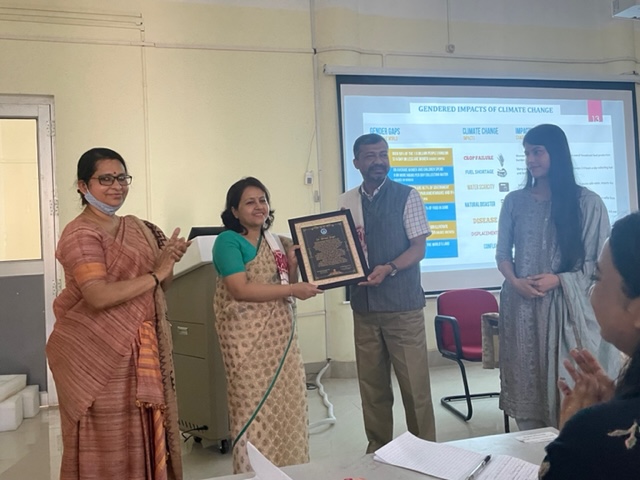-
Title of the events:
International Women's Day on 8th March, 2022
-
Place of event:
Tezpur University
-
Date
2022-03-08
-
Download the report

Event Description
Chandraprabha Saikaini Center for Women Studies, Tezpur University organized International Women’s Day on 8th March, 2022. Dr Nirmali Gogoi (Assistant Professor, Department of Environmental Science,Tezpur University) was invited as the speaker. Dr. Gogoi gave her presentation on “Climate Change and Women”.68 number of students participated in the talk.
The session started with Dr Madhurima Goswami’s address. She wished the audience on women’s day and stressed on the importance of giving recognition to the women in the field of science. Dr Ivy Daimary gave an introduction of the speaker and congratulated Dr Nirmali Gogoi’s path breaking works in the field of science. This year Tezpur University felicitated three leading women scientists from junior and senior levels. The women scientists were selected on the basis of their research and philanthropic work.Dr.Nirmali Gogoi was felicitated as one of the women scientists for her great contribution in science.
Dr Nirmali Gogoi addressed the audience and started her lecture by pointing towards the increasing GDP and the rapid growth of the economy. She questioned the result of this development. Dr Gogoi explained the rapid developments impacting the CO2 concentration in the environment, depleting the Ozone layer. This is leading to the change of temperature. The speaker points towards how this development is breaching the ecological limit, which is leading to the loss of biodiversity, rapid population growth and endangering plant and animal species. The change in the climate is impacting the natural and human systems in the form of physical, social and economic factors .Dr Gogoi suggests that adaption, mitigation and implementing policies must be encouraged to reduce the green house gases. Adaptive capacities deal with vulnerability.
The speaker went on to say that Gender inequity is a crisis within a crisis. Gender inequalities amplify vulnerability. The relationship between climate change and gender is crucial as how people experience climate change depends on their position in the society. Some of the crises due to climate change are poverty, water scarcity, fuel shortage, natural disaster, diseases, displacement, and conflicts. Women suffer more and differently to climate change. The speaker points towards some of the climate change solutions like thinking out of the box, involving women in the management of climate change, proper training to the volunteers, effective leadership, family planning, and women led actions must be funded, women must be trained. Dr Nirmali Gogoi stressed to the audience the importance of conserving traditional knowledge like water harvesting, food preservation, natural resource management. Traditional knowledge enhances local adaptive capacity. She gave an example of an African woman who represents the ‘wisdom pools’.
The speaker said the Agriculture can cope with climate change by limiting erosion, minimum tillage and diverse rotation. This will lead to greater long term profits like – decreased fuel costs, decreased erosion, less greenhouse gas. Controlled release fertilizers are a must. When one uses urea fertilizer, the harvest looks good, but urea is not good for the environment, as Urea is very mobile and spreads to water bodies and soil. Waste management is important. One must reduce the consumption of natural resources. An example of waste management is the making of Biochar. Biochar is useful as it supplies plants nutrients, enhances crop yield and acts as an absorbent. Production methods of Biochar are – conventional, gasifier, pyrolzer, bioenergy. The presentation showed an example of a success story – a climate smart approach to drought in Kenya, led to food, water and livelihood security. Dr Gogoi says Seasonal shift could be dangerous for the crops. Climate smart technique - Double Row Planting, Early weather information are some of the ways to tackle the change in the climate. The speaker concludes the session by saying that Women are powerful agents and Solutions must be encouraged to slow down and mitigate the effects of climate change.
The session opened for questions from the audience.
Dr Madhurima Goswami suggested that we need to bridge the gap between science and social science. As women are change makers, they must be given the position of climate change leaders.
Dr Madhurima Goswami gave the vote of thanks to the speaker, the Assamese Department of Tezpur University, Dr Chandan Kumar Sarmah and to the audience.
Target:Students
Aid:PPT
Impact:The students were enlightened with the knowledge on climate change and how it impact women


